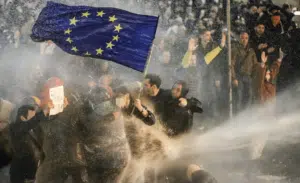Brussels – Citizens of Georgia are again invading the streets of Tbilisi in protest against the ruling Georgian Dream party’s new attempt to get the controversial pro-Russian-inspired draft law on ‘transparency of foreign influence’ passed by Parliament before a return to the polls on October 26. Thousands of people kicked off a new wave of protests, in the country’s capital on Tuesday (April 9) in particular, to express, as they did in March of 2023, their opposition to a law that would risk slowing –if not undermining– Georgia’s path to European Union membership.

The Georgian Dream leadership (now led by former Premier Irakli Garibashvili) announced on April 3 the new attempt to pass the law after amending only one passage of the bill: All organizations that receive more than 20 percent of their funding from abroad will have to register as an ‘organization pursuing the interests of a foreign power’ and not as an ‘agent of foreign influence.’ For pro-democracy opposition groups in the country and Brussels, however, the substance has not changed, and there is still fear of an alignment with what is in effect in Russia since December 1, 2022.
EU institutions in Brussels the day after condemned the government’s plan, implicitly endorsing the new street protests, to make Georgia’s newly appointed prime minister, Irakli Kobakhidze, desist from continuing on this pro-Russian path. Just over a month ago, the Prime Minister had assured the EU High Representative for Foreign Affairs and Security Policy, Josep Borrell, that “by 2030 Georgia will be ready more than any other candidate country for membership.” the European Council’s granting of EU candidate country status on December 14, 2023, was contingent on progress on the EU Commission’s recommendations on freedom of civil society and combating disinformation.

Between March 7 and 8, 2023 – after Parliament passed the first reading of the law – tens of thousands of Georgian citizens had taken to the streets with the flags of Georgia and the European Union, shouting slogans such as Fuck Russian law and covering the city with insults to Putin. After two days of uninterrupted protests, the Georgian Dream party had withdrawn the bill, but without retracting the initiative, as events a year later show. “Georgia’s European path cannot be stopped…nobody can restore the past,” the President of the Republic, Salomé Nino Zourabichvili, attacked the government with a post on X, adding that “no Russian law, nor any other destructive policy, can prevent a determined nation from achieving its goal.” That is, entry into the European Union, as the Georgian leader had made clear from the podium of the European Parliament in Brussels last year.
The complex relationship between the EU and Georgia
Despite being granted candidate status for EU membership, the relationship between Brussels and Tbilisi remains particularly complex due to the divergence of an overwhelmingly pro-EU population and a government that is, to say the least, controversial about pro-Russian tendencies (even though it has applied to join the Union due to fears raised by Kremlin expansionism). Not only is there an evident difficulty in implementing the reforms required by the path to the Union, but over the past two years, there have been incidents that have highlighted the ambiguity of the ruling Georgian Dream party – whose founder is oligarch Bidzina Ivanishvili, who appears in the non-binding resolution of the EU Parliament calling for personal sanctions against him. For example, in May last year, flights between Georgia and Russia resumed after Moscow’s decision to lift the existing ban, and the Caucasian country never aligned with restrictive measures introduced by Brussels against the Kremlin after it invaded Ukraine. Last fall, the government also attempted (unsuccessfully) to impeach the President of the Republic for a series of trips to the European Union that were considered to be violations of the powers of the Head of State under the national Constitution.

Between Brussels’ June 2022 decision not to grant Georgia candidate status yet, there were two large pro-EU demonstrations. in Tbilisi: one ‘March for Europe’ to reiterate the people’s alignment with the values of the Union and a town hall calling for the government’s resignation. The common features of these demonstrations were the flags–white and red of the five crosses (national) and with the twelve stars on a blue field –signs of pro-European alignment and the Georgian anthem interspersed with the Ode to Joy. Before the outbreak of harsh popular protests in March 2023 – supported by Brussels – which at least so far have led to the shelving of the controversial bill on ‘transparency of foreign influence.’
In this context, one should not forget Georgia’s particularly sensitive relationship with Russia, a country with which it borders to the north. Its candidacy for EU and NATO membership – enshrined in its national constitution – has long been a cause of tension with the Kremlin. After conflicts in the 1990s with the two separatist regions of South Ossetia (1991-1992) and Abkhazia (1991-1993) following Georgia’s 1991 independence from the Soviet Union, the situation on the ground was effectively frozen for 15 years, with troops of the newly formed Russian Federation defending the secessionists within the claimed territory. The attempt to reassert Tbilisi’s control over the two regions in the summer of 2008 – that former President Mikheil Saakashvili wanted –led to a violent Russian reaction on August 7, not only in repelling the Georgian army’s offensive but also leading to the invasion of the rest of the national territory with tanks and air raids for five days. Since then, Vladimir Putin‘s Russia has recognized the independence of Abkhazia and South Ossetia and has deployed thousands of soldiers to the two territories to increase its sphere of influence in the Ciscaucasia region, in violation of the August 12, 2008 agreements.
English version by the Translation Service of Withub



![Il presidente della Repubblica, Sergio Mattarella (sinistra), con il presidente del Consiglio Europeo, Antonio Costa [Bruxelles, 20 maggio 2025. Foto: Quirinale]](https://www.eunews.it/wp-content/uploads/2025/05/mattarella-costa-120x86.jpeg)

